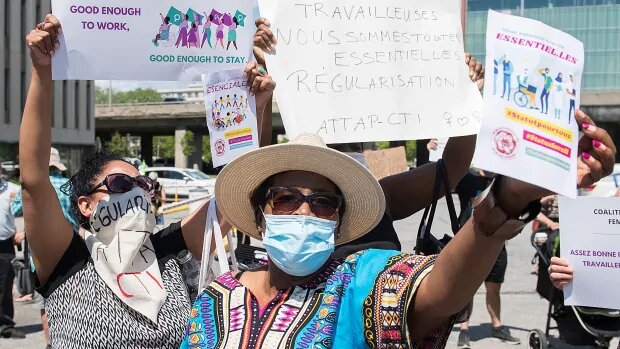A group representing migrant workers in Canada is demanding better protections after two men died from COVID-19, hundreds more have been infected and complaints mount over dangerous work and housing conditions.
A new report paints a grim snapshot of workers who fear for their health and livelihoods after arriving in Canada to perform work the federal government has described as vital to the nation’s food supply.
The Migrant Workers Alliance for Change heard complaints from more than a thousand workers on a variety of issues, including a lack of access to protective equipment, crowded conditions that don’t allow physical distancing, poor access to proper food during quarantine and unfair gouging on wages and meal costs.
The group’s executive director, Syed Hussan, said dismal housing and working conditions have been reported for years, but during the pandemic, they’re even more dangerous.
“Two workers are already dead, hundreds are sick, at least two are in ICU. And we don’t know what tomorrow will bring,” he told CBC News.
Hussan said most migrant workers don’t report conditions out of fear of reprisal, or because they don’t have the ability to do so. They want the federal government to give them permanent resident status so they can assert their right to a safe workplace.
“If you leave a job right now, or you refuse unsafe work, you face termination, homelessness, deportation and you can’t come back in the future. Permanent residence status takes away those limitations on you so you can keep yourself safe,” Hussan said.
$50M to help cover costs
Each year about 60,000 foreign workers come to Canada.
In April, the federal government announced $50 million to help farmers and fish processors who are bringing in temporary foreign workers during the COVID-19 crisis.
Under that program, employers are eligible for up to $1,500 per foreign worker to help cover the costs of complying with a mandatory two-week quarantine upon their arrival in Canada.
Employers must provide accommodation for the employees during the self-isolation period and pay the workers during the 14-day period.
At the time, Agriculture Minister Marie-Claude Bibeau said the funds were to help employers carry out the “vital” work of feeding the nation while protecting the health and safety of Canadians.
“The men and women who work in our food supply chain are essential to ensuring Canadians have access to a variety of high quality food at a reasonable price. In many regions in the country the production of food, particularly fresh fruits and vegetables, relies on the contribution of experienced temporary foreign workers right from planting season to harvest,” she said at the time.
‘Crisis from within a crisis’
The alliance will officially release its report, called “Unheeded Warnings: COVID-19 and Migrant Workers,” at a noon ET news conference today with foreign workers speaking out about their experiences.
Calling the heightened dangers “a crisis from within a crisis,” the report calls for immediate action to address the “fundamental discrimination and exploitation built into Canada’s temporary immigration programs.”
“Until then, there will always be more abuses to expose, indignities to denounce and demands for change to be made,” it reads.
The report says the workload for many foreign hires has intensified during COVID-19, and that some employers are forcing workers to go at “breakneck speed.”
“As fewer workers are coming in, or workers’ arrivals are delayed, migrant workers already here have seen dramatic work intensification: 128 workers reported working for weeks without a day off, being forced to work long hours, and suffering increased strains, injuries and sickness due to increased pace of work,” the report says.
As employment and labour laws exclude migrant workers, there are no rights to minimum wage, overtime pay, hours of work, breaks, days off, or collective bargaining, the report states.
Workers also alleged increased acts of racism from employers, local shops and some community members who treated them like they were “disease carriers.”
The report says 209 migrant workers reported increased intimidation, surveillance and threats from employers, “often under the guise of COVID-19 protocols.”
Reports of anti-black racism
The report also noted a higher number of complaints from Caribbean workers, who are mostly black men.
“Racism, and specifically anti-black racism, underpins workers’ experience,” the report states.
Other complaints outlined in the report include:
- Workers who could not physically distance during the mandatory 14-day quarantine upon arrival in Canada.
- Lack of access to health care and information.
- Unfair wage and meal cost clawbacks.
- Crowded housing conditions after quarantine without essential sanitization.
- Lost income due to border closures and extended travel times.
- Lack of ability to send remittances (payments) to family at home.
CBC News has not verified the complaints in the report.
NDP MP Jenny Kwan says the government must do more to protect foreign workers.
“We say we value them and we need them for our economy, and yes we do. But we also need to ensure that we follow on that when they come to Canada. They should be able to return home safe and sound,” she said.
NDP calls for pathway to residency
Kwan said the federal government must also offer a pathway to permanent resident status under the principle of “good enough to work, good enough to stay.”
Kwan also said the government needs to step up enforcement to make sure employers are treating workers safely and humanely.
Service Canada can carry out inspections, with or without notice, to verify and employer’s compliance with the program, including within the first 14 days of the temporary foreign worker’s arrival.
Between March 1 and May 29, there were 585 inspections, according to a spokesperson for Carla Qualtrough, the Minister of Employment, Workforce Development and Disability Inclusion.
Penalties for not complying with the new conditions include fines of up to a $1 million and bans on hiring foreign workers up to a permanent ban.
The government has not yet responded to a request for information on what penalties, if any, have been imposed to date.
Source link


Be First to Comment